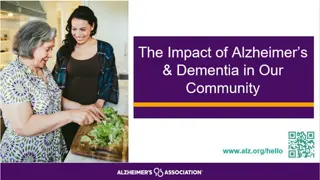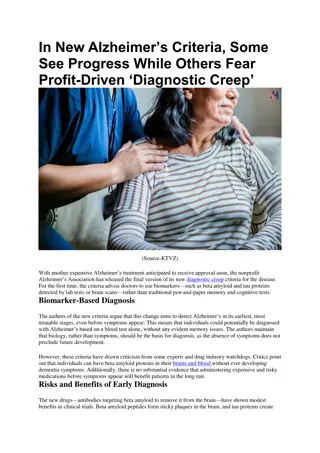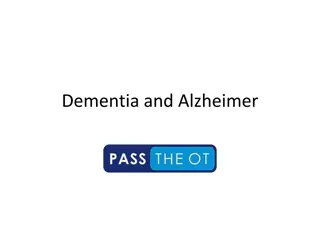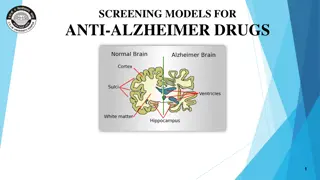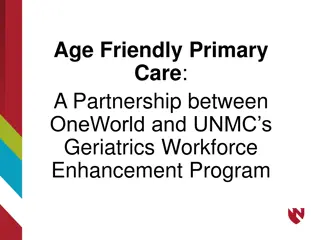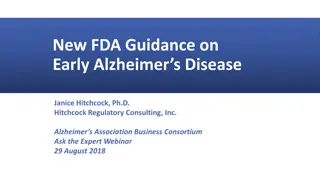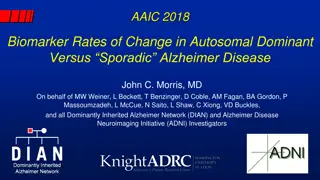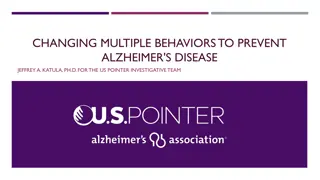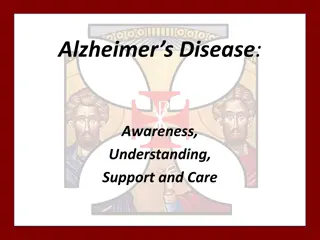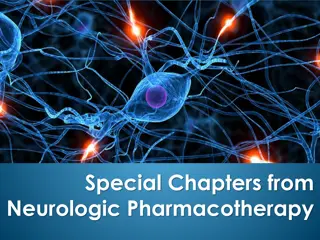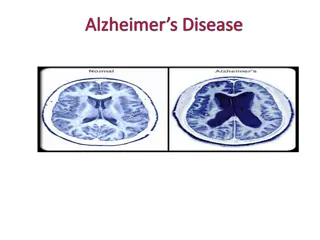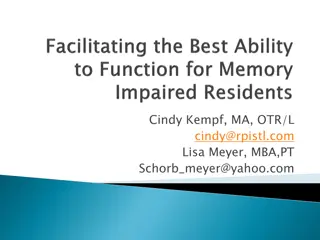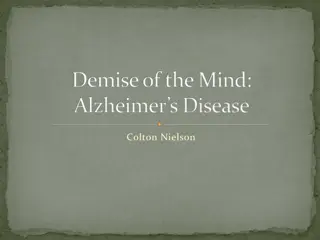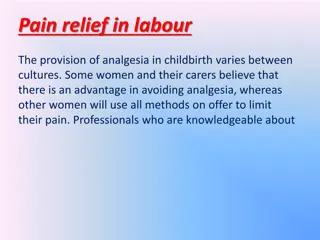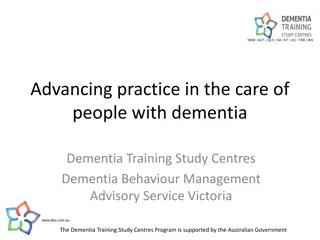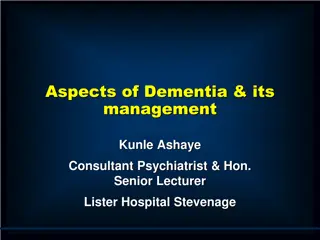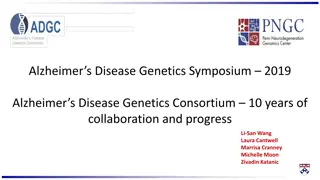Pharmacological Management of Alzheimer's Disease and Cognitive Enhancers
Cognitive enhancers play a crucial role in managing Alzheimer's Disease, with Cholinesterase inhibitors (AChEI) like Donepezil, Galantamine, and Rivastigmine recommended for mild to moderate AD, and Memantine for moderate to severe cases. These medications act through different mechanisms, with AChEI accelerating the brain's function and Memantine acting as a brake to prevent further damage. Combination therapy is also considered, especially for those who are intolerant to or cannot take AChEI. Additionally, treatment for Vascular Dementia focuses on managing vascular risk factors, while alternatives to AChEI like Memantine and SSRIs can address behavioral symptoms. Overall, the mainstay of treatment includes AChEI like Rivastigmine and Donepezil, with Memantine as an option when needed.
Download Presentation

Please find below an Image/Link to download the presentation.
The content on the website is provided AS IS for your information and personal use only. It may not be sold, licensed, or shared on other websites without obtaining consent from the author.If you encounter any issues during the download, it is possible that the publisher has removed the file from their server.
You are allowed to download the files provided on this website for personal or commercial use, subject to the condition that they are used lawfully. All files are the property of their respective owners.
The content on the website is provided AS IS for your information and personal use only. It may not be sold, licensed, or shared on other websites without obtaining consent from the author.
E N D
Presentation Transcript
Cognitive enhancers PINCH ME Anticholinergic burden BPSD Agitation, Aggression and antipsychotics
2 types Cholinesterase inhibitors licensed for mild to moderate AD Donepezil Galantamine Rivastigmine also licensed for treatment of mild- moderate PD dementia Memantine (NMDA glutamate receptor antagonist) licensed for treatment of moderate to severe AD
CEIs put a foot on the accelerator drives the failing brain as hard as it can go Memantine puts a foot on the brakes stops the deteriorating brain from firing off in unhelpful ways (dying neurons release glutamate)
Pharmacological management of Alzheimers Disease (Treat mixed the same ) - AChEI s recommended as options for managing mild to moderate AD. -Memantine people with: -moderate AD intolerant of or who have a contraindication to AChEI or - severe AD. -Combination who are already taking a ACEI: - Consider Memantine in addition to an AChEI if they have moderate disease - Offer Memantine in addition to an AChEI if they have severe disease. Pharmacological management of Alzheimer s Disease (Treat mixed the same ) AChEI s (Donepezil, Galantamine and Rivastigmine) are Memantine is recommended as an option for managing AD for Combination. For people with an established diagnosis of AD
Mainstay of treatment are the ACEI Rivastigmine or Donepezil. - Early RCT s of ACEI demonstrated benefit in cognition in DLB (Mckeith 2000) and also showed benefit upon neuropsychiatric symptoms including hallucinations, apathy, anxiety and sleep disorders. - More recent studies have also shown benefit for Donepezil - Studies also suggest cognitive benefit with Memantine. - Summary- First line ACEI Rivastigmine or Donepezil, if contraindicated or not tolerated Memantine.
No currently licensed treatments for VD within the UK - Treatment therefore focuses on Identification and amelioration of vascular risk factors. If Alzheimer's component then treat with ACEI and Memantine as for AD
ACEI not effective and may cause agitation. SSRI S and Memantine may help behavioural features.
Donepezil (od) Starting dose 5mg daily for one month, then Treating dose (usually) 10mg daily life 70 hrs so good for poor compliance Avoid in liver failure Galantamine (twice daily or modified release) Start 8mg M/R daily increase at monthly intervals to max 24mg ER daily life 8-10 hours Can use in moderate liver and renal disease Rivastigmine (oral bd or patch daily) 1.5mg bd (oral) or 4.6mg/24 hr patch, increasing after one month to max 6mg bd (oral) or 9.5mg/24 hr patch Now can increase to patch of 13.3mg/24 hr after 6 months if signs of deteriorating cognition or worsening symptoms life 1-4 hours Few drug/drug interactions (as metabolised at site of action) Titrate dose in renal and liver disease
Similar tolerability between the 3 oral preparations. Adverse events most common during titration phase. Rivastigmine transdermal patch superior tolerabiliy to capsules and much lower rates of GI side effects Cholinergic side effects most common: nausea, vomiting, dizziness, insomnia and diarrhoea. Most common at start and at dose increases. Dose related and usually transient. Urinary incontinence has been noted, caution with heart, block and supraventricular conduction defects (ideally pulse >60)peptic ulceration, COPD/Asthma, potential to lower seizure threshold
CEIs act to slow the rate of cognitive decline Effective in about 50% patients with AD who try them but you can t tell which patient will benefit so always worth trying Can be very effective for some BPSD however apathy, depression, hallucinations
Assessing meaningful benefits in this variably progressive syndrome is complex and difficult. Response to treatment in patients with AD may be best defined as long term stabilisation or less than expected decline. Initial decline or stabilisation should not be taken as a lack of treatment success. Postponing or slowing the decline in cognitive, functional and behavioural domains represent an important benefit for patients and their carers.
Benefits not only cognition but on functional, behavioural and global outcomes. Delay in admission to nursing home Memantine particularly appears to have benefit in people with aggression, agitation and/or psychotic symptoms which are more common in those with severe Alzheimer's disease Less obvious benefits: Reduced probability of requiring antipsychotic medication over time Studies are also suggesting reduced mortality in those treated with ACEI
Drugs should NOT be stopped just because severity of dementia increases Benefits of treatment are rapidly lost when drug administration is interrupted and are not fully regained when drug treatment is reinitiated DOMINO study (UK Donepezil and Memantine in moderate to Severe Dementia clearly showed both cognitive and functional benefits over 12 months for continued Donepezil, combination therapy or switch to Memantine over placebo. Also delay in admission to residential and nursing home care.
History of heart disease, especially heart block, sick sinus syndrome, bradycardia (NB use of beta blockers) pulse needs to ideally be above 60 beats/min due to vagotonic action (6 beats/min) History of peptic ulcer History of breathing problems History of epilepsy Suspicion of behavioural variant FTD (can exacerbate behaviour and agitation)
NB Bradycardia (< 60 beats/min) review medication if possible Low blood pressure Third degree of complete heart block On beta blockers for heart failure Review medication if possible, otherwise consider memantine as an alternative
Potential Vagotonic effects on heart rate, patients with DLB may be more susceptible due to autonomic instability associated with the disease. Manufacturers therefore recommend caution in patients with cardiovascular disease and in those taking concurrent medications that decrease HR e.g B blockers, digoxin However reviews of the literature have shown that incidence of cardiovascular adverse events is low and serious adverse events rare. Routine ECG before treatment therefore not recommended. Cardiovascular monitoring with ACEI : A clinical Protocol Psychiatric treatment ,Rowland 2009: Check pulse prior to initiation and at reviews. start / continue is >60 bpm Asymptomatic mild bradycardia 50-60 bpm start/ continue but review pulse and symptoms after 1 week and check pulse 1 week after any increase in dose Symptomatic bradycardia or if 50 bpm consider specialist review for underlying cause . If pacemaker fitted consider trial. Cardiovascular monitoring with ACEI : A clinical Protocol Advances in Psychiatric treatment ,Rowland 2009: Advances in
Can cause exacerbation of asthma and copd Use short half life medication if possible Weigh up risk /benefit SEIZURES CEIs and memantine can both lower the seizure threshold Use with caution, if necessary Could consider anticonvulsant cover
CEIs can irritate stomach lining Consider rivastigmine patch if GI symptoms Consider memantine if PU Make sure there is PPI cover on board, especially if coprescribed NSAID, steroids, SSRIs, anticoagulants.
Licensed for moderate and severe AD Recommended by NICE Titration regime from 5mg daily up to 20mg daily (increasing by 5mg daily at weekly intervals) Check renal function to determine end titration dose Cautions with epilepsy Side effects : constipation, hypertension, sedation, drowsiness, headache, hallucinations, sometimes agitation BUT GENERALLY WELL TOLERATED
Metaanalysis evidence for small advantages for : anxiety in dementia apathy, depression/dysphoria and Not useful in acute agitation and aggression In severe agitation and aggression, if a patient is already on CEI consider discontinuation as it may perpetuate agitation or psychosis
Evidence that it may have a retarding effect on the development of agitation and metaanalysis evidence for its benefit in mild to moderate lability, agitation, aggression and psychosis. Not usually effective in severe agitation/aggression.
First choice CEI None CEI CEI None CEI ? Memantine/ssri/atypic al antipsychotics First choice Second choice Memantine None Memantine Memantine None Memantine Language variant? cautious use of CEI possibly Second choice Alzheimer s disease Vascular dementia Mixed dementia DLB MCI PDD FTD
Possible causes P I N C H pain infection nutrition constipation hydration M E medication environment
Treat the underlying cause !! !! e.g. - - hydration and nutrition, - - LAXATIVES for constipation, - - ANALGESIA for pain behaviour may indicate pain and need adequate regular analgesia - - STOP any medication that may be responsible consider anticholinergic burden and adjust meds if possible - - change the environment Treat the underlying cause e.g. - - ANTIBIOTICS for infection, hydration and nutrition, LAXATIVES for constipation, ANALGESIA for pain remember that changes in behaviour may indicate pain and need adequate regular analgesia STOP any medication that may be responsible consider anticholinergic burden and adjust meds if possible change the environment ANTIBIOTICS for infection, remember that changes in
Are they taking their tablets as prescribed? Are they getting side effects? Are their drugs interacting with each other to cause problems? Are they on drugs that need close monitoring of blood levels to make sure they re not toxic e.g. lithium, digoxin .
"Medications with anti-cholinergic properties recognized by the anti-cholinergic cognitive burden (ACB) scale have been recently correlated with an additional 0.33 point decline in Mini-Mental State Examination (MMSE) score over 2 years. There is a significant decline in cognitive ability with increasing anti-cholinergic load.
www.agingbraincare.org/uploads/products/AC B_scale scale_-_legal_size.pdf
Wide range of symptoms that do not follow a predictable path Hyperactivity Agitation, aggression, disinhibition, irritability Psychotic symptoms Delusions, hallucinations Apathy Affective Depression, anxiety All contribute to carer burden and increase likelihood of move to institutional care
BPSD are preventable show respect for the person with dementia Maximise communication Prevent pain (regular analgesia if there are underlying painful conditions, even if pain is not verbally expressed) Engage in meaningful activity Encourage choice and independence Ensure person s fundamental needs are met
Can usually be managed in their current care setting and will resolve within 4 weeks without additional medication BPSD is often an attempt by the patient to communicate an unmet need Vital to consider potential contribution of pain, delirium, environmental and interpersonal factors
Characterised by extreme distress of individual or carer and/or aggression resulting in severe risk to themselves and/or others Consider medication if: Non-pharmacological approaches have failed and risk to patient or others is high enough to consider addition of pharmacological treatment If it s required to implement assessments or investigations for a suspected serious physical health condition by primary or secondary care.
At severe stage many individuals may not have the capacity to consent to treatment for their BPSD Consider use of MCA and discussion with carer and/or IMCA must be considered and carefully documented prior to initiation of pharmacological treatment and on reviews Use relevant policies if considering need to use covert medication
Pharmacological treatment of BPSD remains controversial and challenging as it is not well informed by properly conducted studies and many available agents have been linked to serious adverse effects.
Target the symptoms requiring treatment Discuss treatment options and explain risks to patients (if they have capacity) and family/carers Titrate from a low starting dose and maintain the lowest possible dose for the shortest period necessary. Behavioural symptoms tend to run a natural course and dissipate with time, so most medications can eventually be successfully stopped. Review appropriateness of treatment regularly so that ineffective medication is not continued unnecessarily Monitor for side effects Document clearly treatment choices and discussions with patient and/or family and carers.
Try monitoring behaviour using a rating scale e.g. Cohen Mansfield Agitation Inventory Exclude physical illness PINCH ME Non-pharmacological approaches don t forget the wallpaper and soft furnishings! Pharmacological treatment Shouldn t be first line ideally Risk benefit analysis Consider MCA and Best interests decision
Exclude physical illness Non-pharmacological approaches don t forget the wallpaper and soft furnishings! Pharmacological treatment Shouldn t be first line ideally Risk benefit analysis Best evidence for RSP and aripiprazole for aggression and psychosis (but problems with CVA,VTE, death and caution DLB,PD) other atypicals less effective
Poorly defined inappropriate motor, verbal or vocal activity - sundowning Common in dementia (20-60%) Causes: Delirium Repetitive semipurposeful activity Pain, discomfort Boredom Depression Profound disorientation Medication diuretics, neuroleptics Environmental factors isolation, overstimulation Frustration Communication difficulties
Exclude other cause investigate and treat medical conditions PINCH ME Consider non-pharmacological methods distraction, activity, is the environment too busy? Consider CEI (can occasionally make agitation worse), if on a CEI consider reducing dose and see if things improve Consider antidepressant trazodone, mirtazapine, SSRI for impulsive activity including vocalisation Think about memantine Try and establish good sleep-wake pattern activity, hypnotic, melatonin Perhaps a benzodiazepine (but watch out for paradoxical increase in agitation) or excess sedation and impaired mobility If all else fails consider antipsychotic but cautiously
If hallucinating consider CEI If aggressive and agitated consider CEI, memantine (may need short term use of benzodiazepines in extremis) If PD/LBD ruled out consider risperidone (licensed for short term use), aripiprazole, amisulpride, olanzapine (but watch side effects and CVA risk), PD/LBD possible try lorazepam, if no alternative try small doses of quetiapine 12.5mg/day, olanzapine or aripiprazole - but try to avoid neuroleptics generally if at all possible, clozapine also has some evidence (but needs specialist prescription)
Symptom Apathy Anxiety Depression/dysphoria Symptom First CEI CEI/SSRI Antidepressants if severe symptoms Memantine/sertraline/ paracetamol Risperidone First line line Second line SSRI Mirtazapine CEI Second line Moderate / emerging agitation Severe agitation/aggression Psychosis Insomnia Sertraline/trazodone Olanzapine/aripiprazole/ sertraline Olanzapine/aripiprazole Risperidone/memantine Little evidence
Symptoms Depression Symptoms First line Citalopram/sertral ine First line Second line Mirtazapine Second line Care SSRIs can exacerbate symptoms Care Apathy Psychosis and aggression Rivastigmine Quetiapine (12.5mg) ; olanzapine (2.5mg); clozapine (6.25mg); memantine; third line ECT Memantine Sertraline/citalopram Reduce anticholinergic medication/dopa mine agonist reduction/rivastig mine Avoid antipsychotics if possible Agitation/anxiety Citalopram/sertral ine/rivastigmine Clonazepam 0.25mg REM sleep disorder Melatonin; quetiapine 12.5mg
Problematic side effects : sedation, confusion, extrapyramidal side effects (not with quetiapine) Increased mortality with antipsychotics in dementia warning extended to include all SGA and conventional antipsychotics Increased mortality due to cerebrovascular accidents confirmed association between SGAs and stroke risk apparent from start of treatment with dose response relation SGA increased risk of VTE and aspiration pneumonia Conventional increased risk of cardiac arrhythmias and EPSEs
Modest efficacy, significant increase in adverse effects therefore NOT for routine use in dementia unless severe distress or serious risk of physical harm to those living with or working with patient. Use of risperidone (licensed for persistent aggression in Alzheimer s disease for short term treatment, up to 1mg bd) and olanzapine may be justified in some cases following risk/benefit analysis, MCA assessment and BIA decision. If not tolerated, consider alternatives e.g. aripiprazole, amisulpride Optimal dose of risperidone in dementia found to be 500 mcg bd but start at 250 mcg bd and titrate upwards ONLY if necessary.
Modest efficacy, significant increase in adverse effects therefore NOT for routine use in dementia unless severe distress or serious risk of physical harm to those living with or working with patient. Use of risperidone (licensed for persistent aggression in Alzheimer s disease for short term treatment, up to 1mg bd) and olanzapine may be justified in some cases following risk/benefit analysis, MCA assessment and BIA decision. If not tolerated, consider alternatives e.g. aripiprazole, amisulpride Optimal dose of risperidone in dementia found to be 500 mcg bd but start at 250 mcg bd and titrate upwards ONLY if necessary.
Weight baseline, monthly for first 3 months, then annually if weight stable Lipid profile, blood glucose, prolactin baseline, every 3 months, then annually Pulse, BP and BP baseline, 3 monthly, annually ECG baseline, at 4 weeks, 3 months and then annually QTc interval 440msec men, 470msec female Regular review and consider cautious withdrawal when behaviour settled aim for withdrawal at 6 weeks


